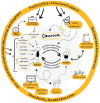Teacher perspectives on the socio-ecological barriers and enablers to food and nutrition education in primary schools: a scoping review
- PMID: 39324339
- PMCID: PMC11504532
- DOI: 10.1017/S1368980024001812
Teacher perspectives on the socio-ecological barriers and enablers to food and nutrition education in primary schools: a scoping review
Abstract
Objective: Schools are identified as a setting for food and nutrition education (FNE) in childhood. FNE is a key strategy to optimise child growth and development and impart life-long food skills. There is limited synthesis of the literature to understand the socio-ecological determinants of teachers and schools engaging in FNE.
Design: For this scoping review, five databases (APA PsycInfo, ERIC, Medline, CINAHL and Scopus) were searched using the terms (and synonyms for) primary school teacher, self-efficacy and food and nutrition. A quality assessment using relevant Johanna Briggs tools was carried out for the included papers. Data were extracted using a modified socio-ecological model, and narrative themes were identified.
Setting: Primary (elementary) schools in high-income countries.
Participants: Primary-school teachers.
Results: Forty-one papers were included in this review from ten countries (predominantly the USA). The narrative synthesis identified five themes that interact with teacher delivery of FNE. These were (i) perceived food and nutrition responsibilities of teachers, (ii) teacher beliefs and self-efficacy, (iii) opportunities to build teacher nutrition knowledge and self-efficacy, (iv) interpersonal contributors and (v) broader environmental, structural and policy contributors.
Conclusions: Multiple strategies are needed to build the capacity of teachers to undertake FNE within primary school settings. These strategies include a focus on learner-centred education that will build teacher agency, school leadership, ensuring the health and well-being of teachers and providing initial teacher education as well as innovative professional development for cross-curriculum integration. Strategies drawing from each level of the socio-ecological framework will increase opportunities for capacity building.
Keywords: Cross-curriculum; Food and nutrition education; Policy; Self-efficacy; Teacher perspectives.
Conflict of interest statement
Danielle Gallegos and Emma Esdaile have received research support from the Children’s Hospital Foundation via a philanthropic donation from the commercial funder Woolworths. Danielle Gallegos and Emma Esdaile declare they have no other conflicts of interest. Lee Wharton and Helen Vidgen declare they have no conflicts of interests.
Figures
Similar articles
-
Collaborative approaches to health education: perspectives of parents and teachers on self-care and managing common health issues in UK primary schools.BMC Health Serv Res. 2024 Oct 30;24(1):1315. doi: 10.1186/s12913-024-11724-3. BMC Health Serv Res. 2024. PMID: 39478624 Free PMC article.
-
Comprehensive school health: teachers' perceptions and implementation of classroom physical activity breaks in US schools.Health Promot Int. 2022 Oct 1;37(5):daac100. doi: 10.1093/heapro/daac100. Health Promot Int. 2022. PMID: 36166261
-
Behaviours that prompt primary school teachers to adopt and implement physically active learning: a meta synthesis of qualitative evidence.Int J Behav Nutr Phys Act. 2021 Nov 20;18(1):151. doi: 10.1186/s12966-021-01221-9. Int J Behav Nutr Phys Act. 2021. PMID: 34801039 Free PMC article.
-
Nutrition across the curriculum: a scoping review exploring the integration of nutrition education within primary schools.Nutr Res Rev. 2022 Dec;35(2):181-196. doi: 10.1017/S0954422421000111. Epub 2021 Apr 30. Nutr Res Rev. 2022. PMID: 33926596
-
Themes in Train-the-Trainer Nutrition Education Interventions Targeting Middle School Students: A Systematic Review.Nutrients. 2021 Aug 10;13(8):2749. doi: 10.3390/nu13082749. Nutrients. 2021. PMID: 34444910 Free PMC article.
References
-
- Patton GC, Neufeld LM, Dogra S et al. (2022) Nourishing our future: the series on adolescent nutrition. Lancet 399, 123–125. - PubMed
-
- Lanigan J & Singhal A (2009) Early nutrition and long-term health: a practical approach. Proc Nutr Soc 68, 422–429. - PubMed
-
- Venter C & Harris G (2009) The development of childhood dietary preferences and their implications for later adult health. Nutr Bull 34, 391–394.
-
- Townsend N, Murphy S & Moore L (2011) The more schools do to promote healthy eating, the healthier the dietary choices by students. J Epidemiol Public Health 65, 889. - PubMed
Publication types
MeSH terms
LinkOut - more resources
Full Text Sources




